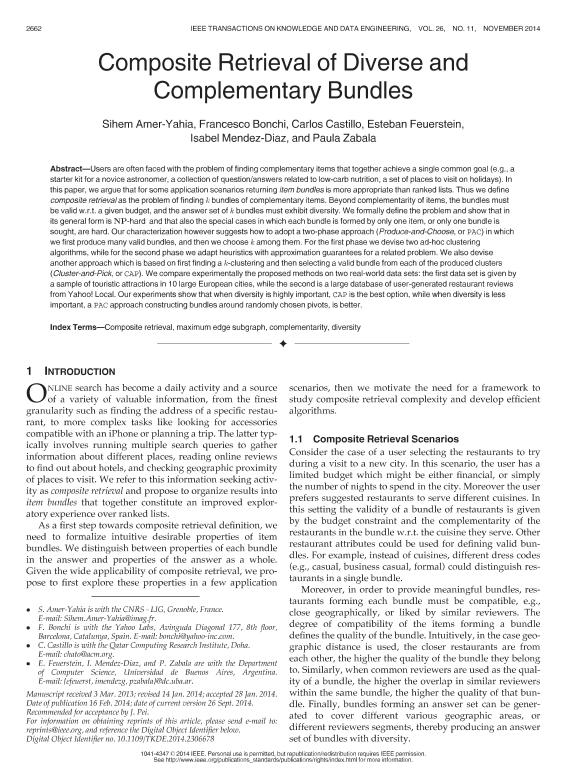Mostrar el registro sencillo del ítem
dc.contributor.author
Amer Yahia, Sihem
dc.contributor.author
Bonchi, Francesco
dc.contributor.author
Castillo, Carlos
dc.contributor.author
Feuerstein, Esteban Zindel

dc.contributor.author
Méndez-Díaz, Isabel

dc.contributor.author
Zabala, Paula Lorena

dc.date.available
2018-01-12T18:38:55Z
dc.date.issued
2014-11
dc.identifier.citation
Bonchi, Francesco; Castillo, Carlos; Zabala, Paula Lorena; Amer Yahia, Sihem; Feuerstein, Esteban Zindel; Méndez-Díaz, Isabel; et al.; Composite Retrieval of Diverse and Complementary Bundles; IEEE Computer Society; Ieee Transactions On Knowledge And Data Engineering; 26; 11; 11-2014; 2662-2675
dc.identifier.issn
1041-4347
dc.identifier.uri
http://hdl.handle.net/11336/33093
dc.description.abstract
Users are often faced with the problem of finding complementary items that together achieve a single common goal (e.g., a starter kit for a novice astronomer, a collection of question/answers related to low-carb nutrition, a set of places to visit on holidays). In this paper, we argue that for some application scenarios returning item bundles is more appropriate than ranked lists. Thus we define composite retrieval as the problem of finding k bundles of complementary items. Beyond complementarity of items, the bundles must be valid w.r.t. a given budget, and the answer set of k bundles must exhibit diversity. We formally define the problem and show that in its general form is NP-hard and that also the special cases in which each bundle is formed by only one item, or only one bundle is sought, are hard. Our characterization however suggests how to adopt a two-phase approach (Produce-and-Choose, or PAC) in which we first produce many valid bundles, and then we choose k among them. For the first phase we devise two ad-hoc clustering algorithms, while for the second phase we adapt heuristics with approximation guarantees for a related problem. We also devise another approach which is based on first finding a k-clustering and then selecting a valid bundle from each of the produced clusters (Cluster-and-Pick, or CAP). We compare experimentally the proposed methods on two real-world data sets: the first data set is given by a sample of touristic attractions in 10 large European cities, while the second is a large database of user-generated restaurant reviews from Yahoo! Local. Our experiments show that when diversity is highly important, CAP is the best option, while when diversity is less important, a PAC approach constructing bundles around randomly chosen pivots, is better.
dc.format
application/pdf
dc.language.iso
eng
dc.publisher
IEEE Computer Society

dc.rights
info:eu-repo/semantics/openAccess
dc.rights.uri
https://creativecommons.org/licenses/by-nc-sa/2.5/ar/
dc.subject
Composite Retrieval
dc.subject
Complementarity
dc.subject
Diversity
dc.subject
Maximun Edge Subgraph
dc.subject.classification
Ciencias de la Computación

dc.subject.classification
Ciencias de la Computación e Información

dc.subject.classification
CIENCIAS NATURALES Y EXACTAS

dc.title
Composite Retrieval of Diverse and Complementary Bundles
dc.type
info:eu-repo/semantics/article
dc.type
info:ar-repo/semantics/artículo
dc.type
info:eu-repo/semantics/publishedVersion
dc.date.updated
2018-01-11T19:36:13Z
dc.journal.volume
26
dc.journal.number
11
dc.journal.pagination
2662-2675
dc.journal.pais
Estados Unidos

dc.description.fil
Fil: Amer Yahia, Sihem. Centre National de la Recherche Scientifique; Francia
dc.description.fil
Fil: Bonchi, Francesco. Yahoo Labs; España
dc.description.fil
Fil: Castillo, Carlos. Qatar Computing Research Institute; Qatar
dc.description.fil
Fil: Feuerstein, Esteban Zindel. Universidad de Buenos Aires. Facultad de Ciencias Exactas y Naturales. Departamento de Computación; Argentina
dc.description.fil
Fil: Méndez-Díaz, Isabel. Universidad de Buenos Aires. Facultad de Ciencias Exactas y Naturales. Departamento de Computación; Argentina
dc.description.fil
Fil: Zabala, Paula Lorena. Universidad de Buenos Aires. Facultad de Ciencias Exactas y Naturales. Departamento de Computación; Argentina. Consejo Nacional de Investigaciones Científicas y Técnicas; Argentina
dc.journal.title
Ieee Transactions On Knowledge And Data Engineering

dc.relation.alternativeid
info:eu-repo/semantics/altIdentifier/doi/http://dx.doi.org/10.1109/TKDE.2014.2306678
dc.relation.alternativeid
info:eu-repo/semantics/altIdentifier/url/http://ieeexplore.ieee.org/document/6742606/
Archivos asociados
